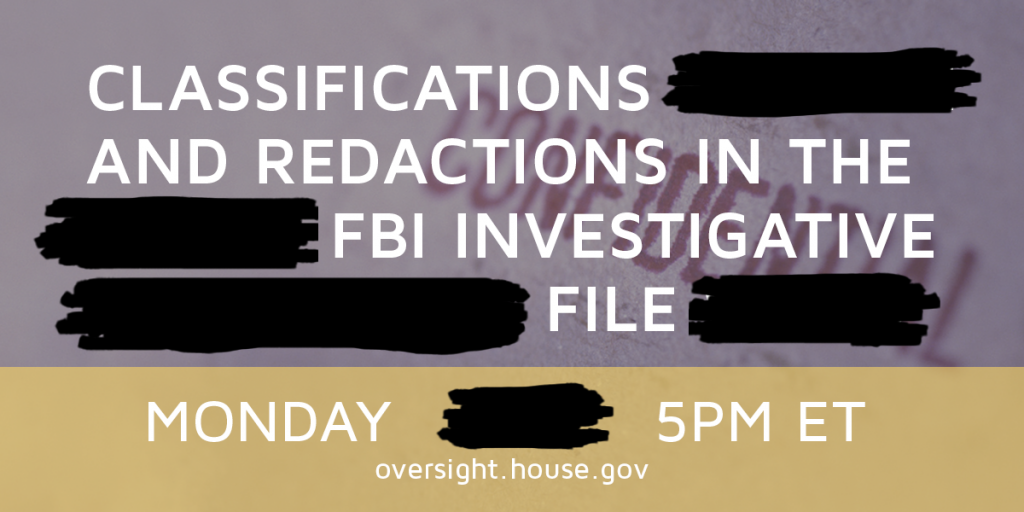Classifications and Redactions in FBI’s Investigative File
- Subject
- Classifications and Redactions in FBI’s Investigative File
- Date
- September 12, 2016
- Time
- 5:00 pm
- Place
- 2154 Rayburn HOB
 TAKEAWAYS:
TAKEAWAYS:
- After the FBI refused to commit to providing the complete investigative file to Congress, Chairman Chaffetz issued a subpoena for the documents.
- The FBI, State, DOJ, and other agencies withheld and redacted information in the documents given to Congress without a legitimate basis.
- Chairman Chaffetz urged the FBI to release a full unclassified copy of the documents to the public.
- The “very sensitive, highly classified” information contained in Secretary Clinton’s emails is so significant to national security it could only be discussed in a closed session.
PURPOSE:
- To provide an opportunity for federal agencies to explain redactions, omissions, and classifications in the criminal investigative file of former Secretary of State Hillary Clinton.
BACKGROUND:
- On July 7, Federal Bureau of Investigation (FBI) Director James Comey testified before the Committee that the FBI would provide to Congress “whatever we can under the law and under our policy.”
- In response to Chairman Chaffetz’s request for Secretary Clinton’s investigative file, the FBI provided a production on August 16 and two supposedly identical copies of the production the following day, August 17.
- The Committee identified numerous documents not included in the August 16 production, in the August 17 production. The FBI did not provide an explanation as to the difference in the productions.
- The documents produced by the FBI did not constitute a complete investigative file as many were substantially redacted or omitted.
KEY VIDEOS:
Transportation and Public Assets Subcommittee Chairman John Mica (R-FL): “That’s not a question. You don’t get to prioritize. Never in the history of investigations that I participated in. We want the information. We are entitled to the information.”
Rep. Gary Palmer (R-AL): “We need to look into the possibilities of how a Secretary of State handling classified information with extreme carelessness may have compromised agents in the field, possibly our national security. There’s a number of issues here and it begs the question, if that’s not the issue, then why are you withholding 302s? And why is so much of this stuff redacted?”
Interior Subcommittee Chairman Cynthia Lummis (R-WY): “[O]ur constituents are worried that classified information was compromised in ways that might allow hackers to refer that information to people who want to do harm to America and its allies.”
Assistant Attorney General for Legislative Affairs
U.S. Department of Justice
Assistant Secretary, Bureau of Legislative Affairs (or her designee)
U.S Department of State
Acting Assistant Director for Congressional Affairs (or his designee)
Federal Bureau of Investigation
Assistant Director for Legislative Affairs (or her designee)
Office of the Director of National Intelligence
Director of Congressional Affairs (or his designee)
Central Intelligence Agency
Chief of Congressional Affairs (or his designee)
National Geospatial-Intelligence Agency
Director of Legislative Affairs Office (or his designee)
National Security Agency/Central Security Service
| Name | Document |
|---|---|
| Transcript | Document |